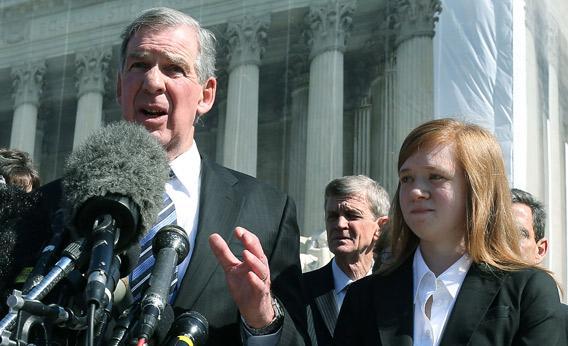“When … do we stop deferring to the university’s judgment that race is still necessary?” Justice Sonia Sotomayor asked during argument this week in this year’s big affirmative action case at the Supreme Court. “That’s the bottom line of this case.” It’s telling that 57 Fortune 100 companies asked the court to keep deferring. They can sympathize with the universities because business leaders have long argued that intermeddling bureaucrats and arrogant judges, in the name of civil rights, substitute their own uninformed hunches for the experienced judgment of the people on the ground—in this case, university officials and admissions departments. Selecting a small entering class from a large group of applicants is a lot like hiring a new employee or deciding who to promote from a large field of hopefuls: Both decisions require subtle judgments that may be hard to defend in court, so a lot turns on how much courts defer to those judgments.
Many opponents of affirmative action hope the court will usher in a new era of pure meritocracy, in which objectively verifiable virtues determine university admissions to the exclusion of racial preferences. This would make a ban on affirmative action easy to apply: Any time the university chose an applicant with lower grade and test scores than one it rejected, we could infer that it discriminated. But even if the court overturns Grutter v. Bollinger, its 2003 ruling, and outlaws the use of race in admissions, the result won’t be a color-blind meritocracy. Universities—like most employers—don’t agree on a simple objective measure of merit. Nor should they. Affirmative action may go, but college admissions decisions will remain controversial—and potentially affected by race—with or without the Supreme Court.
It’s tempting, but wrong, to think that the law could make college admissions like a blind audition for an orchestra, where the director listens to a musician from behind a screen and selects based only on the music, without knowing about superficial characteristics such as race or sex. But university admissions, and hiring, can’t work like this. There is no single, discrete quality that every candidate is judged on. An orchestra might be looking for simply the best violinist or pianist, but universities and employers look for a combination of objective qualifications and soft skills. An employer isn’t looking for “the best” employee in the abstract—it’s looking for the best employer for the job in question. Similarly, a selective university isn’t just looking for applicants with the highest grades and test scores—it’s looking for applicants that, all things considered, best further its educational mission. Many selective universities don’t admit anyone on the basis of grades and test scores alone.
At the same time, the use of race as a crude thumb on an otherwise uniformly used scale has been unlawful since 1979 when the Supreme Court issued its first major affirmative action ruling, in U.C. Regents v. Bakke. Ever since, universities have considered race only as one factor among many in a holistic evaluation of individual candidates. A sweeping repudiation of affirmative action would forbid universities from considering race, but it would not require them to look only at objective criteria like grades and test scores. They would remain free to consider a host of qualitative factors, such as social disadvantage, unusual life experiences, family wealth, experience with prejudice, neighborhood, etc.
And the rub is that a lot of these are racially correlated, and some may be hard to disentangle from race itself. For instance, if a university considers an applicant’s experience with prejudice, in the form of sex discrimination, anti-gay bias, religious bigotry and animosity based on disability, shouldn’t it also consider an applicant’s experience with racism?
Moreover, when an admissions or hiring decision involves multiple subjective factors, its very hard to know whether not race, per se, was one of them. It’s not surprising that opponents of affirmative action zero in on objective measures of qualification and merit, because without them to provide a baseline of equal treatment, it’s hard to tell whether or not a decision maker has discriminated. Civil rights lawyers in employment discrimination cases do the same thing. For instance, if an employer promotes men over women with more experience, civil rights lawyers point to the superior objective qualifications of the women as gotcha evidence. But the employer can always retort that the men chosen for the promotions had better soft skills.
And that claim is almost impossible to refute because the value of soft skills is a judgment call. As employers have shifted from objective qualifications to subjective soft skills, and as the courts have deferred to their judgments, it’s become increasingly hard to prove employment discrimination. As a result, employment discrimination plaintiffs today lose at a higher rate than any other class of plaintiffs in federal court. Unless the court changes the rules for people who are challenging affirmative action, it will be just as hard to prove that a university considering the long list of factors like the one I laid out above factored in race in an admissions decision.
So even if the Supreme Court kills affirmative action, the rancor and frustration surrounding it will live on, in the shape of a restless poltergeist. Some people will continue to complain about affirmative action as long as there is a single black or Latino student in any selective university without perfect grades and test scores. This is true in California, where some applicants still complain that UC-Berkeley and UCLA are secretly considering race—despite the statewide ban on affirmative action—because the number of minority admits has risen slightly in recent years. As in employment, what looks like a nuanced professional judgment to one person looks like a smoke screen for discrimination to another.
